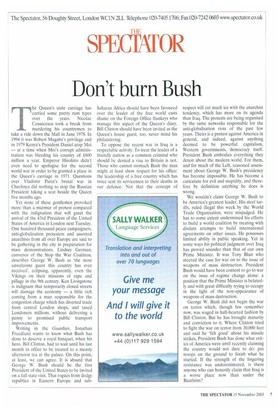Don't burn Bush
The Queen's state carriage has carried some pretty rum types over the years. Nicolae Ceauscescu took a break from murdering his countrymen to take a ride down the Mall in June 1978. In 1994 it was Robert Mugabe's privilege and in 1979 Kenya's President Daniel arap Moi — at a time when Moi's corrupt administration was bleeding his country of £600 million a year. Emperor Hirohito didn't even need to apologise for the second world war in order to be granted a place in the Queen's carriage in 1971. Questions over Vladimir Putin's brutal war in Chechnya did nothing to stop the Russian President taking a seat beside the Queen five months ago.
Yet none of these gentlemen provoked more than a murmur of protest compared with the indignation that will greet the arrival of the 43rd President of the United States of America in London next Tuesday. One hundred thousand peace campaigners, anti-globalisation protesters and assorted anarchists from all over Europe are said to be gathering in the city in preparation for mass demonstrations. Lindsey German, convenor of the Stop the War Coalition, describes George W. Bush as 'the most unwelcome guest this country has ever received', eclipsing, apparently, even the Vikings on their missions of rape and pillage in the 9th century. Ken Livingstone is indignant that temporarily closed streets will damage the economy — a little rich coming from a man responsible for the congestion charge which has diverted trade from central London shops, and taxed Londoners millions, without delivering a penny to promised public transport improvements.
Writing in the Guardian, Jonathan Freedland wants to know what Bush has done to deserve a royal banquet, when his hero, Bill Clinton, had to wait until his last month in office to be treated to a measly afternoon tea at the palace. On this point, at least, we can agree. It is absurd that George W. Bush should be the first President of the United States to be invited on a full state visit. That rogues from dodgy republics in Eastern Europe and sub Saharan Africa should have been favoured over the leader of the free world casts shame on the Foreign Office flunkeys who manage this aspect of the Queen's diary. Bill Clinton should have been invited as the Queen's house guest, too, never mind his philandering.
To oppose the recent war in Iraq is a respectable activity. To treat the leader of a friendly nation as a common criminal who should be denied a visa to Britain is not, Those who cannot stomach Bush the man might at least show respect for his office: the leadership of a free country which has twice sent its servicemen to their deaths in our defence. Not that the concept of respect will cut much ice with the anarchist tendency, which has more on its agenda than Iraq. The protests are being organised by the same networks responsible for the anti-globalisation riots of the past few years. Theirs is a protest against America in general, and indeed, against anything deemed to be powerful: capitalism, Western governments, democracy itself. President Bush embodies everything they detest about the modern world. For them, and for much of the Left, reasoned assessment about George W. Bush's presidency has become impossible. He has become a caricature for evil and stupidity, and therefore by definition anything he does is wrong.
We wouldn't claim George W. Bush to be America's greatest leader. His steel tariffs, ruled illegal this week by the World Trade Organisation, were misjudged. He has to some extent undermined his efforts to build a world coalition by treating with disdain attempts to build international agreements on other issues. He possesses limited ability in public speaking. Yet in some ways his political judgment over Iraq has proved sounder than that of our own Prime Minister. It was Tony Blair who steered the case for war on to the issue of weapons of mass destruction. President Bush would have been content to go to war on the issue of regime change alone: a position that the Prime Minister is belatedly and with great difficulty trying to occupy in the light of the non-appearance of weapons of mass destruction.
George W. Bush did not begin the war on terror which, though few remember now, was waged in half-hearted fashion by Bill Clinton. But he has brought maturity and conviction to it. Where Clinton tried to fight the war on terror from 30.000 feet and said he 'felt good' about his missile strikes, President Bush has done what critics of America were until recently claiming the country would not dare to do: put troops on the ground to finish what he started. If the strength of the lingering resistance was underestimated, is there anyone who can honestly claim that Iraq is a worse place now than under the Baathists?


























































































 Previous page
Previous page